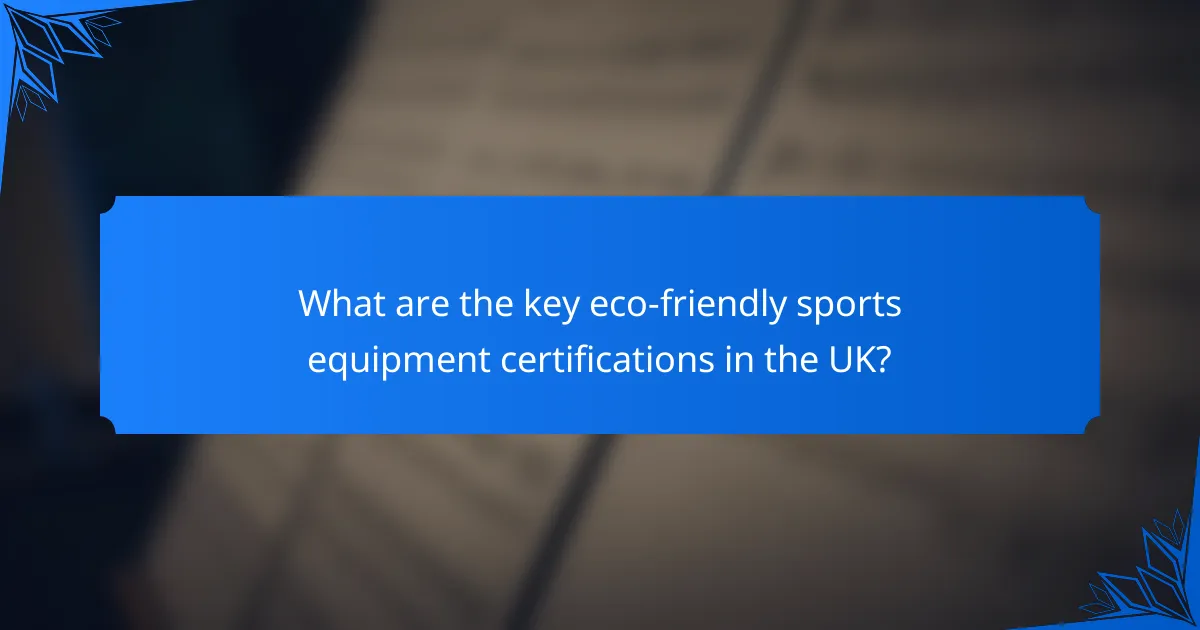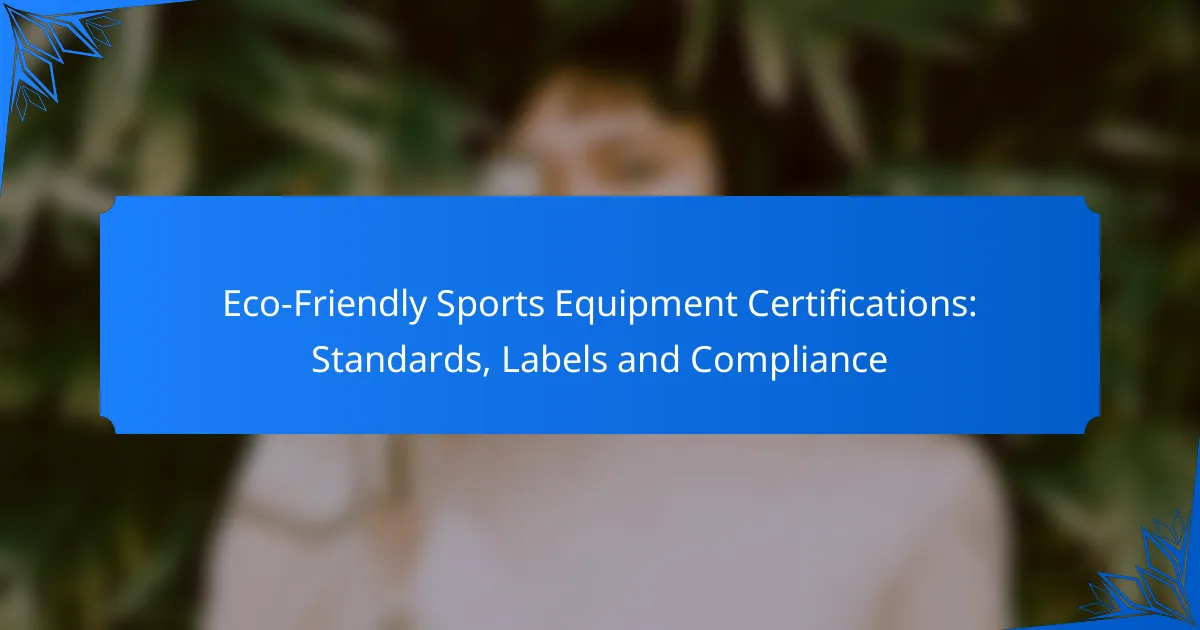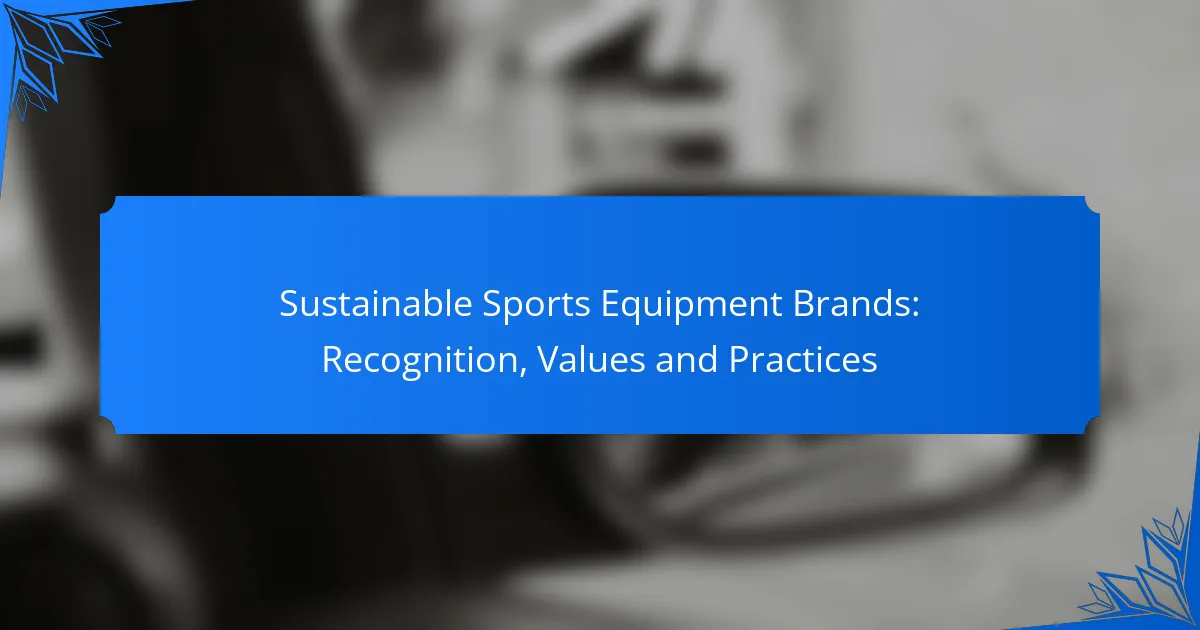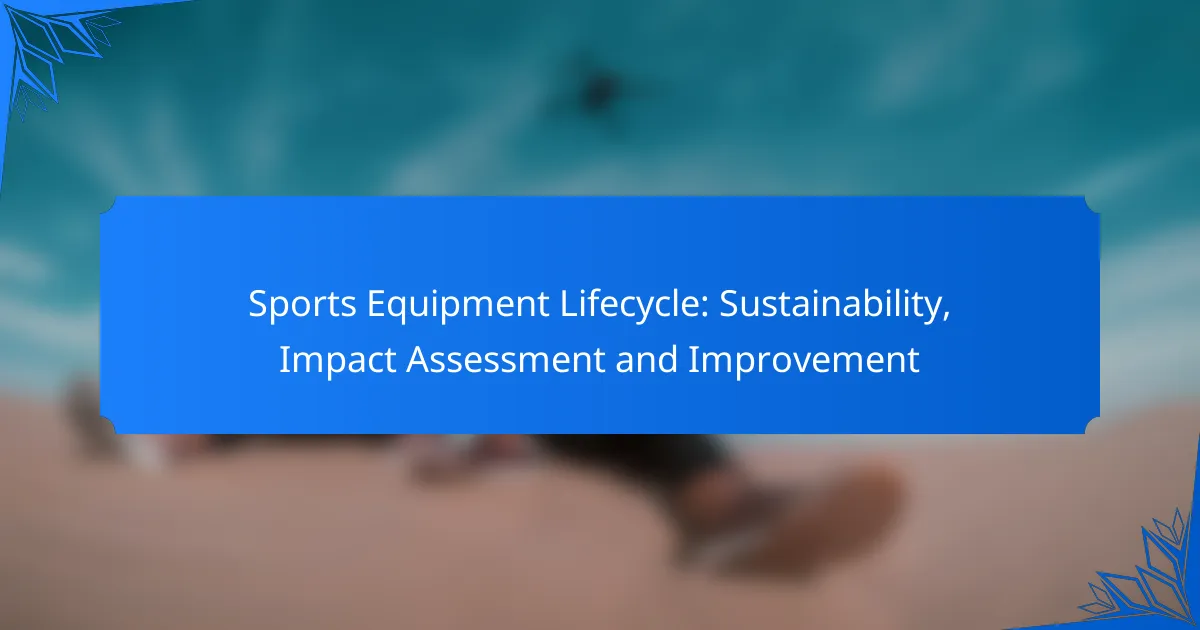Eco-friendly sports equipment certifications play a crucial role in promoting sustainability within the industry by ensuring that products adhere to specific environmental standards. These certifications not only help consumers make informed choices but also encourage manufacturers to implement greener practices, ultimately benefiting both the planet and the athletes who use the gear.

What are the key eco-friendly sports equipment certifications in the UK?
In the UK, several eco-friendly sports equipment certifications ensure that products meet environmental standards. These certifications help consumers identify sustainable options and encourage manufacturers to adopt greener practices.
ISO 14001 Certification
ISO 14001 is an international standard that specifies requirements for an effective environmental management system (EMS). Organizations that achieve this certification demonstrate their commitment to reducing environmental impact and complying with regulations.
To obtain ISO 14001 certification, companies must assess their environmental practices, set objectives, and implement processes to improve sustainability. Regular audits ensure ongoing compliance and continual improvement.
Global Organic Textile Standard (GOTS)
The Global Organic Textile Standard (GOTS) certifies textiles made from organic fibers, ensuring they meet stringent environmental and social criteria. This certification covers the entire supply chain, from harvesting to manufacturing and labeling.
Products labeled with GOTS must contain at least 70% organic fibers and adhere to strict chemical restrictions. This certification is particularly relevant for sportswear made from organic cotton or other sustainable materials.
Forest Stewardship Council (FSC) Certification
The Forest Stewardship Council (FSC) certification ensures that wood and paper products come from responsibly managed forests. This certification is crucial for sports equipment that incorporates wooden components, such as rackets or paddles.
FSC-certified products are tracked from the forest to the consumer, promoting sustainable forestry practices. Look for the FSC label to ensure that your sports equipment supports environmental conservation.
OEKO-TEX Standard 100
OEKO-TEX Standard 100 certifies textiles for harmful substances, ensuring they are safe for human use. This certification is essential for sports equipment made from fabrics, as it guarantees that no toxic chemicals are present in the materials.
Products with the OEKO-TEX label undergo rigorous testing for over 100 harmful substances. This certification is particularly important for items like sportswear, which come into direct contact with the skin.
Energy Star Certification
Energy Star certification applies to products that meet energy efficiency guidelines set by the U.S. Environmental Protection Agency. While primarily focused on appliances, it can also apply to certain sports equipment that uses electricity, such as treadmills or exercise bikes.
Choosing Energy Star-certified equipment can lead to lower energy bills and reduced environmental impact. Look for this label when purchasing electric sports devices to ensure energy efficiency and sustainability.

How do these certifications impact consumer choices?
Eco-friendly sports equipment certifications significantly influence consumer choices by enhancing brand credibility and guiding purchasing behavior. These certifications assure consumers that products meet specific environmental standards, making it easier to select sustainable options.
Increased trust in brands
Certifications foster increased trust in brands by validating their commitment to sustainability. When consumers see recognized labels, they often feel more confident that the products are environmentally friendly and ethically produced.
For example, certifications like the Global Organic Textile Standard (GOTS) or the Forest Stewardship Council (FSC) indicate adherence to rigorous environmental criteria. This transparency can lead to stronger brand loyalty as consumers prefer to support companies that align with their values.
Influence on purchasing decisions
Eco-friendly certifications play a crucial role in influencing purchasing decisions by simplifying the selection process for consumers. Shoppers often prioritize products with certifications, believing they are making more responsible choices.
Research suggests that a significant portion of consumers, especially millennials and Gen Z, are willing to pay a premium for certified eco-friendly products. This trend highlights the importance of certifications in marketing strategies, as brands that prominently display these labels can attract a more environmentally conscious customer base.

What are the benefits of eco-friendly sports equipment?
Eco-friendly sports equipment offers numerous advantages, including reduced environmental harm, better health and safety for users, and increased brand loyalty among consumers. By choosing sustainable options, athletes and organizations can contribute to a healthier planet while enjoying high-quality gear.
Reduced environmental impact
Using eco-friendly sports equipment significantly lowers the environmental footprint associated with manufacturing and disposal. Materials sourced from sustainable practices, such as recycled plastics or organic fibers, help minimize waste and pollution. For instance, products made from recycled materials can reduce energy consumption during production by a notable percentage.
Additionally, eco-friendly equipment often adheres to strict sustainability standards, ensuring that the entire lifecycle—from production to disposal—meets environmental criteria. Choosing brands that prioritize sustainability can lead to a collective reduction in the industry’s overall ecological impact.
Improved health and safety standards
Eco-friendly sports equipment is often designed with user health and safety in mind, utilizing non-toxic materials and safer manufacturing processes. This focus on health can reduce the risk of exposure to harmful chemicals commonly found in conventional sports gear, such as volatile organic compounds (VOCs) and phthalates.
Moreover, many eco-friendly products undergo rigorous testing to meet health and safety regulations, ensuring they are safe for athletes of all ages. For example, certifications like the Global Organic Textile Standard (GOTS) or OEKO-TEX® Standard 100 indicate that the materials used are free from harmful substances.
Enhanced brand loyalty
Consumers today are increasingly aware of environmental issues and often prefer brands that demonstrate a commitment to sustainability. By offering eco-friendly sports equipment, companies can foster stronger connections with their customers, leading to enhanced brand loyalty. This loyalty can translate into repeat purchases and positive word-of-mouth marketing.
Brands that prioritize eco-friendly practices often engage in transparent communication about their sustainability efforts, which resonates with environmentally conscious consumers. For instance, sharing information about sourcing, production methods, and certifications can build trust and encourage customers to choose their products over competitors.

How can consumers verify eco-friendly claims?
Consumers can verify eco-friendly claims by checking for recognized certifications and evaluating the transparency of brands. Understanding these elements helps ensure that the products meet environmental standards and are genuinely sustainable.
Checking certification labels
Certification labels are crucial indicators of a product’s eco-friendliness. Look for labels from reputable organizations such as the Forest Stewardship Council (FSC) for wood products or Global Organic Textile Standard (GOTS) for textiles. These certifications often require compliance with strict environmental and social criteria.
When assessing labels, consider the scope of the certification. Some labels may cover only specific aspects, such as materials used, while others may address the entire production process. Always verify the certification’s validity by checking the issuing organization’s website.
Researching brand transparency
Brand transparency involves how openly a company shares information about its sourcing, manufacturing processes, and environmental impact. Look for brands that provide detailed information on their websites regarding their sustainability practices and supply chain. This can include reports on carbon emissions, waste management, and labor practices.
Additionally, consumer reviews and third-party assessments can provide insights into a brand’s commitment to eco-friendliness. Brands that actively engage with customers and respond to inquiries about their sustainability efforts are often more credible. Avoid brands that are vague or defensive about their environmental claims.

What are the compliance requirements for manufacturers?
Manufacturers of eco-friendly sports equipment must comply with various environmental standards and regulations to ensure their products are sustainable and safe. This involves adhering to specific guidelines related to materials, production processes, and waste management.
Adherence to UK environmental regulations
In the UK, manufacturers must comply with regulations such as the Environmental Protection Act and the Waste Electrical and Electronic Equipment (WEEE) Directive. These regulations set standards for reducing environmental impact and promoting recycling.
Manufacturers should ensure that their products are made from sustainable materials and that their production processes minimize waste and emissions. Regular audits and assessments can help maintain compliance and improve environmental performance.
Certification processes and documentation
To achieve certification for eco-friendly sports equipment, manufacturers typically undergo a series of evaluations that assess their adherence to environmental standards. This process often includes submitting documentation that outlines materials used, production methods, and waste management practices.
Common certifications include ISO 14001 for environmental management and various product-specific labels. Manufacturers should keep detailed records of compliance efforts and be prepared for periodic reviews to maintain their certifications.

What are the challenges in obtaining eco-friendly certifications?
Obtaining eco-friendly certifications presents several challenges, including high costs and complex compliance processes. These hurdles can deter manufacturers and brands from pursuing certification, despite the growing consumer demand for sustainable products.
High costs of certification
The financial burden of obtaining eco-friendly certifications can be significant. Costs may range from hundreds to thousands of dollars, depending on the certification body and the specific standards required. Smaller companies often struggle to allocate budgets for these expenses, which can limit their ability to compete in the eco-friendly market.
Additionally, ongoing costs such as annual fees, audits, and potential product modifications can add to the financial strain. Brands should weigh the potential return on investment against these costs to determine if certification is feasible for their business model.
Complexity of compliance processes
Compliance processes for eco-friendly certifications can be intricate and time-consuming. Each certification may have its own set of requirements, documentation, and testing protocols that must be meticulously followed. This complexity can overwhelm companies, especially those without dedicated compliance teams.
To navigate these challenges, businesses should consider seeking guidance from consultants who specialize in eco-certifications. Establishing a clear plan and timeline for compliance can also help streamline the process and reduce the risk of delays or non-compliance issues.

How do eco-friendly certifications evolve over time?
Eco-friendly certifications adapt as environmental science advances and consumer awareness increases. These certifications reflect the latest sustainable practices, materials, and technologies, ensuring that sports equipment meets evolving ecological standards.
Emerging standards and practices
New eco-friendly standards and practices are continually being developed to address the growing demand for sustainable sports equipment. Organizations like the Global Organic Textile Standard (GOTS) and the Forest Stewardship Council (FSC) are leading the way by establishing criteria for organic materials and responsible sourcing.
Manufacturers are increasingly adopting practices such as using recycled materials, reducing carbon footprints, and ensuring fair labor conditions. For example, some brands now offer equipment made from recycled plastics or sustainably sourced wood, appealing to environmentally conscious consumers.
To stay informed, consumers should look for certifications that reflect these emerging standards. Checking labels for recognized eco-certifications can help ensure that the products they purchase align with their sustainability values.



